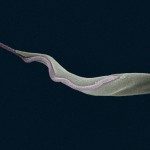Link to Pubmed [PMID] – 11180129
Eur. J. Immunol. 2001 Feb;31(2):634-45
The Xid mutation predominantly affects the development of B cells and consequently the levels and composition of natural antibodies in sera. In contrast to the congenic and susceptible BALB/c strain, immunodeficient BALB.Xid mice display a resistant phenotype both to acute Trypanosoma cruzi infection and to the development of severe cardiopathy. Because natural antibodies are known to be basically self-antigen driven, IgM and IgG natural antibody repertoires (NAR) were compared before and during infection in these two strains. The analysis revealed fundamental alterations of IgM and IgG NAR in pre- and post-infected Xid mice. In particular, relatively increased natural (pre-existing) autoreactive IgG, dominated by the unique recognition of a single band in autologous heart extracts, was typical for uninfected Xid mice. This natural autoreactive IgG directed to heart antigens disappeared early after infection not only in Xid, but also in individual BALB/c mice that survived the acute infection. Conversely, the subgroup of BALB/c mice that died early after infection presented the most pronounced instances of the rapid, relative increase of IgM reactivities to self and non-self proteins. These results suggest that self-reactive NAR may play a role in an immunoregulatory mechanism relevant for the determination of susceptibility/resistance to infections. This may act either by influencing specific responses, or by modulating the self-aggressive components responsible for pathology.

